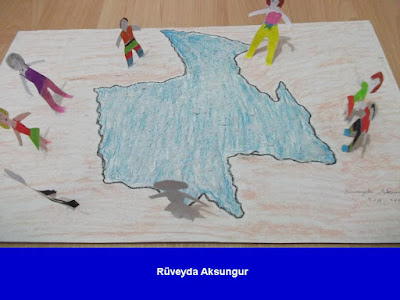TURKEY
Our students chose Tuz Gölü (Salt Lake) for the geographical feature introduction.
SPAIN
NORTHERN IRELAND
All about Strangford Lough
Wildlife and Conservation
The Lough’s variety of habitats gives
rise to exceptionally rich and varied marine life. Over 2000 marine animal and
plant species have been found. Recognition has been given to the importance of
the flora and fauna of Strangford Lough with national, European and
international designations including: Special Area of Conservation, Special
Protection Area, Ramsar site, Areas of Special Scientific Interest and Marine
Nature Reserve.
The Lough has many wildlife attractions throughout the year:
Winter
Sept - Feb
is the best time to see the huge flocks of overwintering and migratory birds
particularly at North
End Shores
Spring /Early Summer
Many wild
flowers are at their best in spring and early summer. This is a very good time
to visit Killard.
Summer
Look out for the terns which come to the Lough to breed. Watch their spectacular dives for food.
All year
Seals can be seen swimming or hauled out at any time of year, particularly around theNarrows . Common seals pup in June /
July. Visit Cloghy Rocks at low tide for the best views.
Evenings are particularly special on the eastern shores of the Lough as the sun sets in the west, turning the water and the sandflats to magnificent shades of red, magenta and gold.
The Northern Ireland Environment Agency, the National Trust and the Wildfowl and Wetlands Trust all undertake conservation work, from monitoring species to habitat managment, on and around the Lough.
Pictures courtesy of _______ and the Northern Ireland Environment Agency.
The Lough has many wildlife attractions throughout the year:
Winter
Spring /Early Summer
Summer
Look out for the terns which come to the Lough to breed. Watch their spectacular dives for food.
All year
Seals can be seen swimming or hauled out at any time of year, particularly around the
Evenings are particularly special on the eastern shores of the Lough as the sun sets in the west, turning the water and the sandflats to magnificent shades of red, magenta and gold.
The Northern Ireland Environment Agency, the National Trust and the Wildfowl and Wetlands Trust all undertake conservation work, from monitoring species to habitat managment, on and around the Lough.
Pictures courtesy of _______ and the Northern Ireland Environment Agency.
Culture, People and Places
Strangford
Lough’s heritage is breathtaking, a 10,000 year spectrum spanning Mesolithic
flint and shell middens; prehistoric tombs; early Christian raths, medieval
monasteries with their herb gardens and fishtraps; Anglo Norman towerhouses;
and magnificent 17th and 18th century estates with their mansions and exotic
gardens.
The Lough’s location, rich resources and sheltered
bays with natural harbours led people to embrace a ‘maritime culture’ that ,
for centuries, depended on the sea for a way of living and communicating, and
only faded with the coming of better land access. Throughout the centuries people have left a rich legacy of buildings, monuments, agricultural practices, literature and and stories.
"Strangford Lough: An Archaeological Survey of the Maritime Cultural Landscape." Lough" by Dr Thomas McErlean, Rosemary McConkey and Wes Forsyth, produced by the Northern Ireland Environment Agency, is one of the best references on the area.
Today, tourism, recreation, agriculture and commercial fishing are the main industries. Environmental management and scientific research are also important. The Queen's University Marine Research Station in Portaferry brings students and lecturers from all over the world and much of the work has a basis in the Lough's extraordinary marine life and tidal currents. The area is also noted for having a very large proportion of artists and craft people.

















































